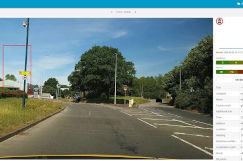Ringway has employed a form of artificial intelligence (AI) technology to allow essential highways maintenance checks to safely continue. The mobile data collection system with a broader vision in road video capture increases AI-based added value to support operations. Ringway is one of the strongest consulting companies in UK road and infrastructure management industry.
In partnership with Vaisala and Hertfordshire County Council, the Ringway team had originally started a trial in February to determine whether AI could be used to record road defects. When the COVID-19 crisis hit in March, the trial of the technology was accelerated as it helped with social distancing measures. Picture shows the video software trained to identify signage.

‘The Vaisala RoadAI technology requires only one member of the highways team to inspect the designated route. In place of the second team member, it uses video recording technology to capture and transmit footage, including individual network defects, to a Vaisala cloud system for automated analysis,’ Ringway said.
After the AI data analysis, based on machine learning, the footage is then available for review to help teams plan their maintenance actions.
Following the successful pilot and implementation of the RoadAI system in Hertfordshire, Ringway is discussing deploying the application with many other clients and is now able to move to single person inspections for the duration of the current working restrictions.
Yogesh Patel, process and improvement director at Ringway, said: ‘This is a brilliant example of where one of our teams has applied new technology to a conventional process and resolved a real and immediate problem with some excellent results.’
As a result of the new technology, Ringway has been able to redeploy many drivers and inspectors, originally used for road inspections to other essential highway maintenance activities.
Kevin Carrol, Ringway Hertfordshire divisional manager, said: ‘The safety of our people is paramount, and by using this technology we are able to ensure they are working in a safe environment.
‘Secondly, it allows us to continue with essential road maintenance during lockdown and in line with government recommendations. Social distancing, and limitations with public transport, has meant that roads are now the principal choice on which people are travelling and we need to ensure they are safe for emergency services, key workers and the general public.’
Cllr Phil Bibby, cabinet member for highways at Hertfordshire County Council, said: ‘This technology is great news for drivers in Hertfordshire. We’re always trying to find new and better ways of doing things, and the COVID-19 restrictions have given us the impetus to take rapid leaps forward that might otherwise have taken months to implement.
‘I’m really pleased that Ringway has been able to deploy this technology and continue with road inspections under difficult circumstances while freeing up staff for essential maintenance work.’
Read the original news article on Highways magazine’s website.
